Exploring the Noble Houses of Game of Thrones


Intro
The realm of Westeros is as intricate as the tapestries that adorn its halls. Each noble house is steeped in stories, painted with colors that reflect their philosophies, values, and even their follies. For fans of Game of Thrones, choosing a house isn’t just a whim; it’s an exploration of identity. It’s as if one is donning the sigil and motto of a family, resonating with the ideals they embody.
In this journey of discovery, we weave through the myriad of houses, examining the threads that bind them to the fans and to each other. We’ll uncover the histories that shape these noble families and delve into the motivations and character development that adds depth to their narratives. With each house carrying its own legacy, the significance of the choice is profound.
This guide aims to illuminate the unique traits, cultural implications, and existential connections that emerge from selecting a house in this captivating saga. By understanding the essence of these houses, fans can appreciate the extensive lore and rich character dynamics that breathe life into the Game of Thrones universe.
Character Dissections
Key Characters and Their Significance
Amongst the labyrinth of characters, a handful stand out, shaping the tale in unforeseen ways. Take Tyrion Lannister, portrayed as the underestimated wit amidst the squabbling giants of his family. His evolution from a marginalized member of House Lannister to a key player in the realm provides a rich commentary on intellect, power, and the search for belonging.
- Tyrion Lannister: His struggles highlight the battle against prejudice and the desire for acceptance. The layers of his character display an amalgamation of humor, cunning, and deep vulnerability.
- Daenerys Targaryen: Her arc resembles a phoenix rising from the ashes. Starting as a timid exile, she transitions into a fierce contender for the Iron Throne. The journey also serves as a profound lesson on the consequences of ambition and the weight of history.
- Jon Snow: The bastion of honor in a realm riddled with treachery. His development from a perceived outsider to a leader reflects the complexities of loyalty and sacrifice.
Character Development Throughout the Series
The beauty of these characters is their growth, akin to fine wine that matures over time. Characters often find themselves at crossroads, facing decisions that will etch their destinies. Consider Jaime Lannister—once known as the Kingslayer, his journey takes him from contempt to a begrudging sense of morality. Such transformations not only deepen personal arcs but also intertwine with the greater narrative, underscoring the theme of redemption.
The emotional resonance of these evolutions reflects the trials and tribulations that define the human experience, making them relatable even in a fantasy setting.
Impact on the Overarching Storyline
The characters form the backbone of the Game of Thrones narrative, each action rippling into the lives of others. A moment of betrayal can lead to an avalanche of conflict, while an act of bravery can ignite hope. The show exemplifies the interconnectedness of individual fates, like threads of a grand tapestry—each thread vital in shaping the whole.
"In Game of Thrones, every character is a story, and every story has the power to change the course of the realm."
Understanding these archetypes allows fans to connect more deeply with the series. It isn't merely a story about dragons and battles, but rather a reflection of the human condition, revealing truths about loyalty, ambition, and the desire for belonging.
Episode Breakdowns
In our forthcoming sections, we will dissect pivotal episodes detailing key events and their implications, whilst illuminating the overarching themes that resonate throughout the series. Each episode serves as a piece of the puzzle, contributing to the rich narrative landscape that is Westeros.
Through this exploration, readers can enrich their connection to the Game of Thrones narrative, illuminating their understanding of what it truly means to be part of a 'house' within this world.
Prologue to the Concept of Noble Houses
In the intricate world of Game of Thrones, noble houses stand as the backbone of the social structure in Westeros. Each house carries its own sigil, motto, and a long, storied history, shaping not just their identity but also their role within one of the most complex narratives ever told. Understanding these houses is essential, as it brings to life the dynamics of power, loyalty, and betrayal that run deep throughout the series.
Noble houses are more than just fictional entities; they mirror the realities of social hierarchies and political maneuvering. In essence, they represent the eternal struggle for power—a theme that resonates in various cultures and times. The houses embody distinct characteristics that result from their histories, values, and the decisions made by their ancestors. This uniqueness draws fans into the rich tapestry of the story, making them more invested in the fate of their chosen house.
Understanding House Dynamics
At a glance, house dynamics might seem straightforward—a family supporting their own. However, dive a little deeper, and you'll find layers upon layers of relationships, rivalries, and intricate webs of loyalty. Inter-house relationships echo the age-old adage of "keep your friends close, but your enemies closer." Each noble house is constantly strategizing, forming alliances or rivalries based on shared goals, betrayals, past grievances, or even mere convenience.
For example, the relationship between House Stark and House Lannister epitomizes this dynamic. On the surface, it may seem rooted in disdain and conflict, yet moments of unexpected collaboration highlight the multifaceted nature of alliances in Westeros. Fans often find themselves drawn to the interplay between houses, analyzing what each decision entails within the greater narrative where every move is potentially a double-edged sword.
Importance of Allegiance in Westeros
Allegiance in Westeros is a matter of life and death, often dictated by a complex web of loyalty and tradition. In a land rife with treachery, shifting loyalties are commonplace. It’s not simply about being born into a house; one’s allegiance can change based on circumstances, demonstrating the fluid nature of power dynamics.
The most dramatic displays of allegiances are seen during key battles and political maneuvers, where characters must choose sides that could propel them to greatness or lead to their downfall. The battle for the Iron Throne symbolizes this struggle vividly; individuals seek power for themselves, but their choices can lead to disastrous outcomes not just for them but also for their entire house.
For instance, when Ned Stark attempted to uphold his allegiance to the crown and his moral code, the consequences were fatal. This brings about an important reflection: the concept of honor and loyalty in Westeros is not merely commendable; it's a potential pathway to ruin. This complexity ensures that fans remain engaged, pondering each character's motivations and the potential repercussions of their alliances.
"In Westeros, the only constant is change; houses rise and fall, alliances shift, and loyalty is tested at every turn."
Exploring the concept of noble houses is akin to unraveling a grand tapestry, where each thread contributes to the larger design. The significance of these houses impacts the decisions we see on screen and invites viewers to examine their themes and values in parallel with their own lives.
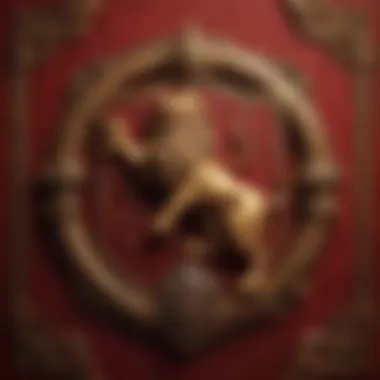
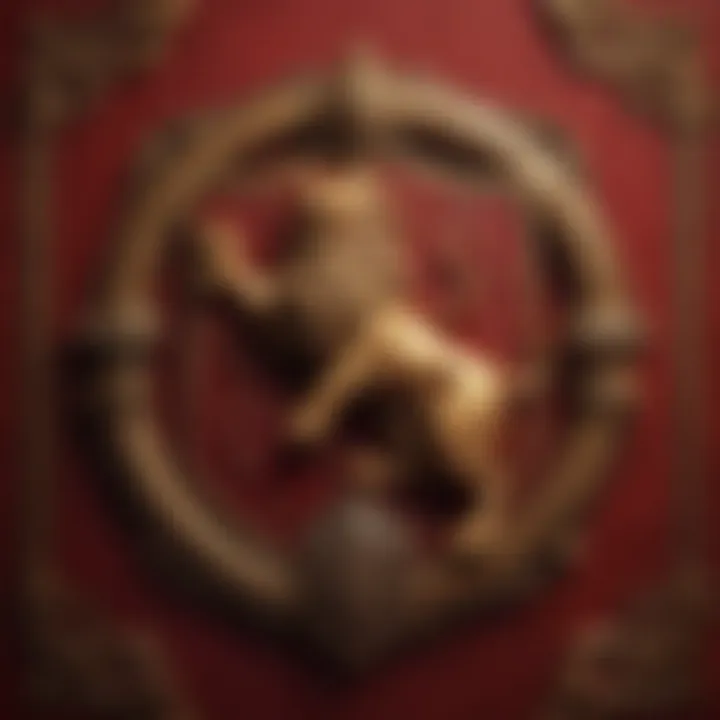
Choosing My Game of Thrones House
Selecting a Game of Thrones house isn’t just a whimsical act; it's a thoughtful engagement with the rich lore and the philosophies that underpin the series. Each house—be it Stark, Lannister, or Targaryen—carries with it a legacy, a set of values and a part of the Game of Thrones story woven into the fabric of Westeros. Understanding what each house represents allows fans to form deeper connections to the narrative, enriching their experience beyond mere observation of character arcs and plots.
The act of choosing a house can feel like stepping into a larger narrative, one where the decisions echo themes of loyalty, ambition, or honor. It invites each person not only to reflect on their preferences but to consider how they view the world, what traits they admire, or which struggles resonate with their own experiences. By diving into the values and histories of these noble houses, fans can gain insights into their own beliefs and aspirations.
Criteria for Selection
When choosing a house, there are several criteria that can guide the decision-making process. Here are some key factors that may come into play:
- Core Values: What does the house stand for? Stark values honor, while Lannister emphasizes wealth and power. Understanding these can help narrow personal alignments.
- Historical Context: Each house has its history—marked by triumphs and tragedies. Delving into the past of a house will provide a clearer picture of its current position in Westeros and how that speaks to you.
- Notable Characters: The individuals that embody these houses can also sway selections. Whether it's Arya Stark’s resilience or Tyrion Lannister's wit, characters often personify the essence of their houses in memorable ways.
- Symbolism: Many fans feel a connection to the house sigils and mottos. The direwolf of the Starks or the golden lion of the Lannisters—each symbol carries a weight that can influence emotional resonance.
When considering these criteria, one might even create a sort of personal checklist, weighing what matters most to them in their connection to the Game of Thrones universe.
Personal Resonance with House Values
Personal resonance isn't merely about agreeing with a house's values; it's about feeling an intrinsic connection. For many, the selection process becomes an exploration of self-identity, often leading them down a path of introspection. For example, individuals who have faced significant challenges may find themselves drawn to House Stark's themes of resilience and loyalty. In contrast, those who admire ambition and cunning might gravitate towards House Lannister.
Moreover, the interplay between fan identity and house values makes one consider:
- What experiences shape your outlook? Your past, decisions, and struggles inform which house you identify with the most.
- What values resonate deeply? Do you prioritize honor, unity, ambition, or perhaps a mix of these?
- How do you perceive the actions of characters from various houses? Your judgments about their decisions may reflect your own priorities and moral compass.
Ultimately, choosing a house isn’t a simple assignment of traits; it’s a reflection of how we view our lives and how we carve our own narratives. This act deepens the relationship with the Game of Thrones world, transforming passive enjoyment into a participatory journey.
House Stark: The Resilience of Winter
When we think of the essence of Game of Thrones, House Stark immediately springs to mind. The Stark family embodies a certain rugged durability, rooted in their history and geography. Residing in the cold, unforgiving North, they reflect the resilience that their environment demands. This starkly contrasts with houses like Lannister or Targaryen, revealing the raw, unfiltered essence of loyalty, honor, and perseverance.
Foundations of the Stark Legacy
The Stark legacy is built upon a foundation of tradition, honor, and the relentless fight for justice. From the ancient days of their founding, linked closely to the infamous Long Night, they symbolize tenacity. Their ancestral seat, Winterfell, serves not just as a physical stronghold but also as a bastion of their values. The sprawling castle, with its old walls and haunting legends, mirrors the Stark motto, "Winter is Coming." This phrase captures the essence of their vigilance. It’s a constant reminder of the potential threats lurking beyond their borders, both human and supernatural.
- Winterfell is more than an abode; it is a character in its own right.
- Each Stark leader has shaped the house through various trials and tribulations, reflecting the ongoing narrative of struggle for survival.
- The close-knit family ties, stressed by loss and hardship, show the importance of community in the face of adversity.
Core Principles of Honor and Loyalty
Honor and loyalty serve as the bedrock for House Stark. These principles dictate the decisions of each family member, making them distinct in a world where manipulation often trumps dignity. In modern storytelling, these ideals might seem simplistic, yet they provide a refreshing perspective amongst the swirling intrigues of Westeros.
"The North remembers."
This phrase echoes not only a sense of retribution but also a reminder of the strength found in loyalty to one’s roots. Starks display a dogged loyalty not only to family but also to the land and its people. They often go to great lengths to protect their own, regardless of personal cost. It’s this unwavering code that resonates deeply with many fans, drawing parallels in their own lives about honoring commitments and standing by loved ones even when times get tough.
- The contrast of Stark honor against the cunning nature of houses like Lannister creates compelling narratives.
- Relatable characters such as Ned Stark exemplify these traits, embodying the struggle between personal ideals and the harsh games played in Westeros.
Impact on Audience Perception
House Stark's representation in Game of Thrones fundamentally shapes audience perceptions about heroism and loyalty. Fans connect deeply with characters like Jon Snow and Arya Stark, figures who personify resilience. Their stories inspire viewers to reflect on their own values and allegiances, intertwining personal struggles with those felt in the narrative.
The stark (pun intended) differences between Stark loyalty and Lannister cunning lead to contemplation about what it truly means to be noble or powerful. Fans often view Stark characters as embodiments of integrity in a landscape where sentimentality can lead to dire outcomes.
- Strong visuals, like the icy landscapes of Winterfell, reinforce feelings of nostalgia and belonging.
- Viewers who have faced betrayal or moral dilemmas resonate with the Starks’ unwavering commitment to their principles.
Ultimately, House Stark encapsulates a philosophy that resonates across generations. The importance of honor, loyalty, and emotional depth transcends the textual boundaries of a fantasy saga, engaging an audience that seeks connection with these timeless human experiences.
House Lannister: Wealth and Power Dynamics
House Lannister stands at the pinnacle of influence in the world of Westeros. Their reputation for wealth and strategic cunning plays a crucial role in the power struggle portrayed throughout the series. They are often described as the richest family in the realm, and this affluence fuels a number of the central conflicts within the story. The power dynamics they operate under provide important lessons in allegiance, betrayal, and the darker edges of ambition in human nature.
Historical Context of the Lannister Family
To fully grasp the significance of House Lannister, it’s essential to delve into their history. Originating from the western lands, the Lannisters established themselves in Casterly Rock, a fortress rich not just in stone, but in gold. Many whisper that the family's wealth comes from extensive gold mines hidden in the mountains, making them formidable players in political games. The most notable members include Tywin Lannister, whose iron-fisted rule shaped the kingdom's landscape, and his children, Jaime, Cersei, and Tyrion, each playing pivotal roles in the unfolding narratives of betrayal and power struggles.
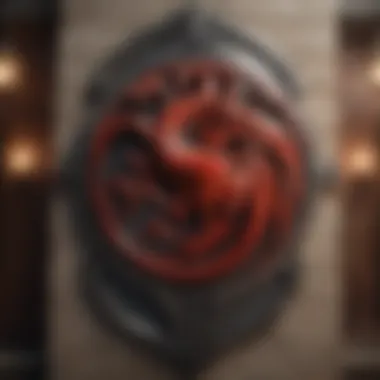
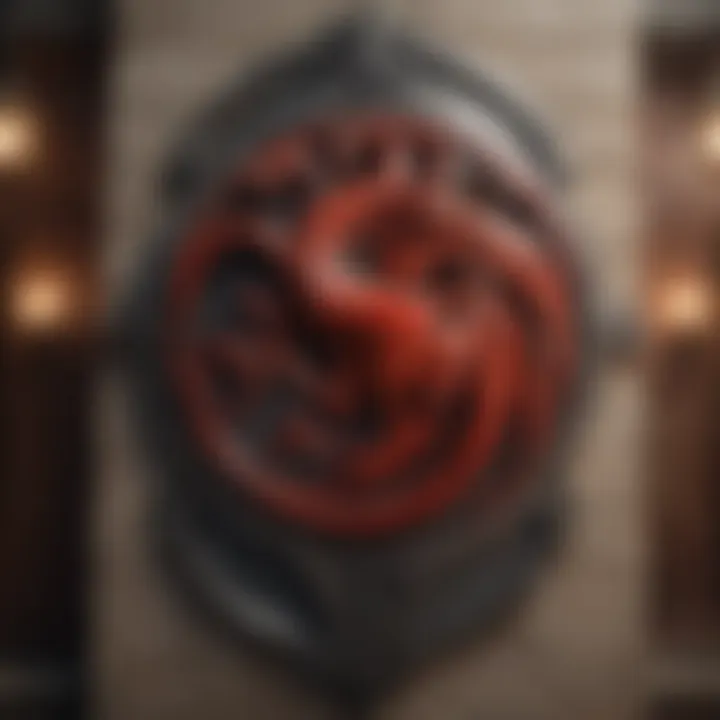
"Hear Me Roar!" – This lion symbolizes the relentless ambition and fierce pride of House Lannister.
Historically, the family's stature has attracted both allies and enemies, leading to alliances that are often as strong as they are fragile. Watching these relationships evolve offers a fascinating reflection on loyalty and the costs associated with it.
Exploring the Notion of Cunning
Cunning and intelligence are the trademarks of House Lannister. The ability to outmaneuver rivals is often more valuable than brute strength. Characters like Tyrion Lannister exemplify this cunning through their wit and capacity for strategic thinking. He often becomes the most unpredictable factor in the chaotic political landscape of Westeros, navigating threats with sharp intellect rather than sheer force.
These qualities are part of a broader theme in the story that reflects the intricate game of thrones itself. The phrase “When you play the game of thrones, you win or you die” encapsulates the high stakes involved. Cunning, therefore, isn't just a trait; it's a survival skill in a world where the throne can often be a deadly seat.
Symbolism in the Lion
The lion is the sigil of House Lannister, a symbol resonating with strength and majesty. This imagery is more than aesthetic; it encapsulates the identity the Lannisters have shaped over centuries. Much like a lion, they command respect and embody an air of dominance. The lion's characteristics—pride, territoriality, and ferocity—parallel the Lannisters' approach to both their enemies and their allies.
The color gold associated with the lion also speaks volumes. It indicates their wealth and status—qualities that are central to their influence. Such symbolism gives fans a deeper understanding of House Lannister and adds layers to their actions throughout the series.
House Targaryen: Legacy of Fire and Blood
House Targaryen, once the ruling dynasty of Westeros, is a vivid example of the complexities and nuances involved in the theme of power and its consequences. Their narrative is one of dramatic rise and tragic fall — a tale that delves deep into the human condition and the very essence of ambition, legacy, and the haunting shadows of history. This house stands as a testament to the notion that glory comes at a hefty price and that the burden of greatness can lead one into madness.
The Targaryens are renowned for their dragons and their fire, both literal and metaphorical. Their legacy is not just about ruling Westeros with an iron fist; it encapsulates the imperfections and vulnerabilities of human nature. Without a doubt, they play a critical role in shaping the cultural landscape of the Game of Thrones universe. The house is a reflection of the duality of power — grace juxtaposed with brutality, dreams intertwined with nightmares.
The Rise and Fall of the Targaryens
The saga of the Targaryens begins with Aegon the Conqueror, who, with his dragons, united the Seven Kingdoms under one crown. This moment marked the beginning of a new era, showcasing the power of ambition fueled by the love for conquest. The resilience and determination of House Targaryen to rule over Westeros is admirable yet underscores a dangerous obsession with power.
However, as much as they soared high in the flames of glory, their eventual descent was equally catastrophic. The civil war known as the Dance of the Dragons illustrates how the very forces that once elevated them also became the catalyst for their downfall. One cannot help but ponder how their propensity for in-fighting within the family resulted in the near-extinction of their lineage. The downfall of the Targaryens serves as a cautionary tale: the higher you fly, the harder you fall.
Themes of Madness and Greatness
Central to the Targaryen narrative is the theme of madness, often manifested through members of the family spiralling into insanity. The notion that “every Targaryen is a bit mad” is well-known among fans and reflects the intricate balance of greatness and madness. Characters like Aerys II, known as the Mad King, exemplify how absolute power can corrupt absolutely. His reign was marked by paranoia and ruthlessness, ultimately leading to his assassination and the family’s exile.
This duality — the potential for greatness shadowed by madness — invites profound contemplation on how power can warp one’s psyche. Are their actions a product of their noble blood, or simply the flaws of human nature? It nudges fans and theorists alike to dig deeper into what governs our own actions when faced with power and responsibility.
Cultural Impact on Fans
House Targaryen has had a significant impact not only within the narrative of Game of Thrones but also among its fervent fanbase. The dragons, the distinct silver hair, and the fiery personalities of Targaryen characters serve as potent symbols of strength and resilience. Fans often find themselves drawn to the complexity of these characters — their ambitions, their flaws, and the heavy burdens they carry.
Moreover, the rise of Targaryen-centric merchandise, art, and fan fiction demonstrates the house’s lasting significance. Fans engage in countless forums, such as on sites like reddit.com, discussing their theories about the Targaryen legacy, the possible resurgence through Daenerys, and the implications of their heritage. The cultural contributions from this house resonate far beyond the pages of the books or the scenes on screen, inviting a wider discourse on the themes of power, identity, and the human experience.
"House Targaryen shows us that our past shapes our present, and from devastation can arise the opportunity to redefine one's legacy."
By exploring the legacy of House Targaryen, fans of Game of Thrones confront essential questions about morality, power, and the consequences of our choices. Their story is a compelling fusion of history and fantasy, leaving an indelible mark on the series and enriching the overall tapestry of Westeros.
Cultural Representations: What Each House Signifies
Understanding how cultural representations come into play within the Game of Thrones universe provides a fresh lens on the series' intricate narratives. Each noble house conveys a specific ethos that resonates beyond the text, touching audiences on a personal level. This exploration goes into the essential elements that reflect the values, identities, and beliefs of the houses while also delving into the broader implications of their significance in the fandom. For fans, these representations are not mere artifacts of storytelling; they influence identity, inspire loyalty, and enrich personal connections to the series.
Embodiment of Values Through Symbols
Every house in the Game of Thrones lore has its symbols that embody unique values. For instance, the sigil of House Stark features a direwolf, representing honor, loyalty, and resilience. The wolf stands as a metaphor for family and strength, ingrained in the identity of the North. Conversely, House Lannister's crest—a golden lion—symbolizes power and wealth, but it also brings to mind cunning and ruthlessness. The choice of animal fosters a deeper understanding of the familial spirit behind each house.
These symbols do more than reflect individual traits; they also create a visual shorthand for the audience. When a fan sees a lion or a wolf, it invokes a set of associations tied to the overarching themes of the series—the struggle for power, the importance of family, and the harsh realities of survival in a volatile world. Being able to identify a house based on its symbol alone speaks to the impact these representations have on collective fan consciousness.
House Colors and Their Significance
Beyond symbols, the colors associated with each house convey powerful messages and evoke emotional responses. House Stark embraces shades of grey and white, reminiscent of the harsh winters and the stark realities of life in the North. These colors evoke feelings of endurance and stability. In contrast, House Targaryen showcases red and black, signifying fire and blood—a reflection of their fierce history and the fiery passion of its members.
Colors serve as a backdrop for what a house stands for, creating an unspoken dialogue between the house and its followers. For instance, in battle scenes, the vibrant colors against the backdrop of war amplify the stakes of allegiance, painting a vivid picture of loyalty and conflict. Fans often associate with these colors personally, choosing to wear them not just as a nod to fandom but as a statement of belonging and identity.
"A house's colors are part of its DNA; they whisper stories of valor, treachery, and the age-old dance of power that defines the realm of Westeros."
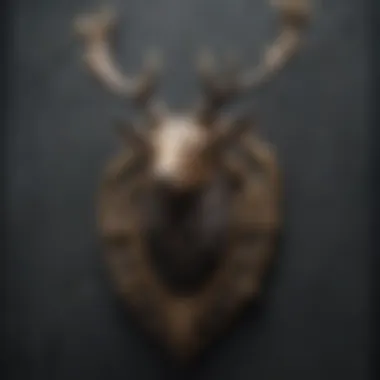

In essence, the colors and symbols of the Game of Thrones houses create a rich tapestry of meaning that transcends the screen. They serve as points of connection, inviting fans to explore their own values and experiences through the lens of Westeros.
Overall, analyzing the cultural representations found in the noble houses enhances our appreciation of the complexities embedded in the Game of Thrones saga. It highlights the impact these houses have on fans, shaping community and identity within the broader context of the series.
Inter-House Rivalries and Relationships
The dynamics of inter-house rivalries in the Game of Thrones world is crucial in understanding not just the narrative but also the themes that resonate with fans. Each house represents a unique set of values and ambitions. Conflicts arise, not merely from competition for the Iron Throne, but from deeply rooted grudges, betrayals, and ideologies. Analyzing these rivalries reveals a tapestry of motivations and desires that push characters to extremes. The outcomes of these conflicts set - or unset - the stage for alliances and the overarching quests for power.
Case Studies of Notable Conflicts
For instance, the rivalry between House Stark and House Lannister provides a vivid backdrop to the series' central plots. The Starks, with their values steeped in honor, clash with the Lannisters, who often prioritize cunning above all. A particular flashpoint occurs at the execution of Ned Stark, which showcases how far ambition can stretch the bonds of loyalty. Fans see reflections of their struggles—integrity against opportunism—and these narratives strike a chord.
Another compelling conflict is between the Targaryens and nearly all of Westeros. Their attempts to reclaim the throne lead to a series of bloody confrontations, filled with dragons and fire. Fans often ruminate on the Targaryen legacy—both its allure and inherent peril—connecting the tale to broader themes of legacy and redemption.
"Rivalries are not mere plots; they are the storm of human emotions that propel actions, leading to eras of both glory and ruin."
Strategic Alliances and Marriages
In the treacherous political landscape of Westeros, strategic alliances emerge as pivotal survival strategies. Marriages often serve as a diplomatic tool for houses aiming to strengthen their positions. Take, for example, the marriage alliance between House Targaryen and House Velaryon. This union not only consolidated power but also reinforced the Targaryen claim to rule through blood ties and loyalty.
Fans often appreciate these intertwining stories of relationships and betrayals, highlighting the lengths individuals go to secure their future, even at the possible cost of forging genuine connections.
Critical to note is the famous alliance between the Stark and Lannister houses. Initially formed by marriage, the alliance quickly devolved into bitterness and conflict, showing how even the best-laid plans can backfire in the face of ambition. This theme prompts viewers to ponder: what constitutes true loyalty and the role it plays in the face of betrayal?
In the end, exploring inter-house rivalries and relationships unveils the complexities within the Game of Thrones universe. Each connection or conflict enriches the narrative, compelling fans to analyze the symbolism and implications that these relationships carry. Even after the show's final episode, the threads of rivalry and strategy continue to weave a rich fabric in the fandom.
Fandom Perspectives: Identification with Houses
When diving into the world of Game of Thrones, one quickly realizes the depth and breadth of identity associated with the noble houses. Fans find pieces of their own character within these houses, forming unique bonds that go beyond mere admiration for the show. This section explores how these connections manifest, highlighting two crucial elements: the reasons for such identification and the various fandom activities that grow from it.
Why Fans Identify with Specific Houses
Identifying with a Game of Thrones house often stems from shared values, personal circumstances, or even aspirations. For instance, House Stark, with its fundamental principles of honor and loyalty, appeals to individuals who hold similar beliefs in their own lives. Fans often resonate with the motto "Winter is Coming," which, while carrying a warning, also embodies resilience in the face of adversity.
In contrast, House Lannister might draw those who are more pragmatic and who appreciate cunning as a pathway to success. The saying, "Hear Me Roar!" becomes a battle cry for those proud of their achievements and who see ambition as essential to their identity.
Some fans may be attracted to the fiery nature of House Targaryen, where themes of passion and ambition take precedence. Their motto, "Fire and Blood," symbolizes an unstoppable force, appealing to those who thrive on intensity and drama in their lives.
"Each house tells a story, and fans see their own lives reflected in these narratives."
Ultimately, the identification with a particular house can serve as a mirror, offering fans a way to introspect and understand their own motivations, values, and principles.
Role-Playing and Fandom Activities
The identification with houses isn't just an inner experience; it often extends to various fandom activities that allow fans to express their affiliations tangibly. Role-playing serves as a dominant mode of expression, where fans don the personas of their chosen houses, immersing themselves deeply in the lore and traditions. This plays out in conventions, online platforms, and in local gatherings.
- Cosplay: Many enthusiasts take to creating detailed costumes that reflect the distinct styles of characters from their favorite houses.
- Role-Playing Games (RPGs): Games tailored to the Game of Thrones universe enable fans to inhabit the lives of lords, ladies, and common folk, all while advancing their own narratives within the rich tapestry of Westeros.
- Discussion Forums: Websites such as Reddit host numerous discussions where fans debate house tactics, potential alliances, and historical accuracies, nurturing a sense of community.
Moreover, in the digital age, social media platforms like Facebook and dedicated forums facilitate even broader engagement. Fans organize events, thematic watch parties, and even workshops to learn about the historical inspirations behind the houses.
The End: The Personal Significance of House Selection
In assessing the significance of choosing a noble house within the Game of Thrones universe, it's clear this is not just a whimsical exercise; it's a reflection of personal values and principles. Each house embodies distinct characteristics, values, and cultural legacies that resonate deeply with fans. The allure of selecting a house goes beyond the surface; it taps into the intricacies of identity, aspiration, and connection to a greater narrative. For many, this choice can serve as an anchor in a world filled with chaos, encouraging introspection and engagement with themes of loyalty, honor, and even ambition.
Reflection on House Impact in Popular Culture
The impact of the different houses transcends the confines of the screen or the pages of George R.R. Martin's novels. House Stark's "Winter is Coming" mantra has become a rallying cry, promoting resilience in the face of adversity. Likewise, House Lannister’s motto, "Hear Me Roar!", encapsulates the quest for power and wealth. Each saying carries weight, influencing how people perceive these houses and, by extension, themselves.
Moreover, houses like Targaryen stir a sense of fascination with their fiery heritage, encapsulating a dramatic essence that resonates in storytelling. This connection to popular culture illustrates how these houses shape our understanding of morality and decision-making. It provides an emotional lens, allowing fans to explore their own values through the prism of these fictional legacies.
Continuing the Legacy of Westeros
In considering how to carry forward the legacy of Westeros, it’s vital to recognize that the world of the Seven Kingdoms isn’t static. The stories told around the themes of loyalty, betrayal, and honor can inspire one to think beyond the screen. Fans often partake in discussions and activities that breathe new life into these narratives. This engagement can be seen through various mediums - from cosplay to fan art, and from online forums like Reddit to meetups celebrating the lore of Westeros.
"Choosing allegiance to a house is more than a fandom; it’s a statement about who we aspire to be."
Acknowledging the richness of these traditions helps cement one’s connection to both the house they resonate with and the overarching narrative of survival in a world rife with political intrigue. Ultimately, it is through this engagement that the legacy of the Game of Thrones continues to thrive, carving out a place in popular culture that encourages lasting conversations.



